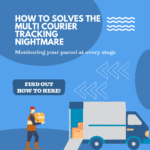As the festive season fades, January brings its own challenges for deliveries across the UK. Snow, ice, and freezing temperatures can cause January shipping delays, disrupting everything from international freight to last-mile deliveries. Whether you’re a business managing logistics or a consumer waiting on parcels, understanding these disruptions can help set realistic expectations.
Here’s a look at how winter weather affects shipping and deliveries in January, along with practical advice to keep things moving.
Winter Weather’s Impact on UK Shipping
Shipping Routes Disrupted
Severe weather conditions often lead to January shipping delays, particularly for maritime routes:
- Snow and Ice: Ports can become inaccessible due to snow-covered access roads, delaying cargo operations.
- High Winds and Rough Seas: Gale-force winds and large waves are common in January, forcing ships to reroute or delay departures.
- Low Visibility: Fog and heavy snowfall hinder safe navigation, causing vessels to reduce speed or wait for clearer conditions.
Road and Rail Challenges
It’s not just the seas that face disruption. Inland transport also feels the effects of winter weather:
- Treacherous Roads: Snow and ice make road travel hazardous, slowing lorries and delaying deliveries.
- Rail Disruptions: Ice on tracks and salt spray near coastal areas can lead to train cancellations or slower service.
Both scenarios contribute to widespread January shipping delays, affecting businesses and consumers alike.

Economic and Consumer Impact
The knock-on effects of January shipping delays are significant:
- Rising Costs: Prolonged transit times mean higher operational expenses for businesses.
- Disrupted Supply Chains: Industries relying on just-in-time delivery may face production stoppages or stock shortages.
- Delayed Deliveries: For consumers, this means waiting longer for parcels, with perishable items at greater risk of damage.
How to Mitigate January Shipping Delays
For Businesses
Shipping companies can take several steps to minimise disruptions caused by January’s unpredictable weather:
- Weather-Responsive Planning
- Use advanced forecasting tools to identify and avoid severe weather zones.
- Build buffer times into delivery schedules to accommodate delays.
- Winter-Ready Vehicles
- Equip lorries with snow tyres, de-icing tools, and heating systems to tackle icy roads.
- Consider air freight for time-sensitive shipments to bypass maritime delays.
- Transparent Communication
- Keep clients informed about potential delays due to weather. Providing real-time tracking updates builds trust and reduces frustration.
For Consumers
While January shipping delays can’t always be avoided, there are ways to prepare:
- Order Early: Place orders well in advance to account for possible delays.
- Stay Informed: Monitor weather forecasts and carrier updates to anticipate disruptions.
- Choose Flexible Delivery Options: Opt for click-and-collect services or extended delivery windows to avoid missed parcels.
Long-Term Adaptations for the Industry
To combat recurring January shipping delays, the UK shipping industry is adopting innovative strategies:
- Improved Infrastructure: Ports are upgrading de-icing equipment and investing in heated storage facilities.
- Resilient Fleet Enhancements: Shipping companies are deploying vessels better suited to rough winter conditions.
- Sophisticated Weather Forecasting: Advances in meteorology enable more precise predictions, allowing shippers to plan routes and schedules more effectively.
January shipping delays are an annual hurdle for UK logistics, but they’re not insurmountable. By focusing on preparation, transparent communication, and technological innovation, businesses can minimise disruptions. Consumers, too, can play their part by planning ahead and staying informed.
Despite the challenges, the shipping industry continues to adapt, ensuring that winter delays don’t grind commerce to a halt. With the right strategies, January can be a month of resilience and reliable service rather than frustration.
- Evri Delivery Service Signs New 4-Year Deal with Vinted to Support Second-Hand Fashion Growth

- How To Solves the Multi Courier Tracking Nightmare

- From Click to Doorstep: How Real-Time Parcel Tracking Is Shaping Us

- Parcel2Go Label Error: How to Fix and Reprint Your Shipping Label

- Evri DHL Merger: Creating UK’s Top Parcel Delivery Powerhouse

- DPD Missed Delivery: A Comprehensive Guide to Tracking and Resolving with EveryParcel

- UK Parcel Tracking Gets a Boost with ASOS and InPost’s Next-Day Locker Delivery

- How to Become an Evri ParcelShop: Boost Your Sales & Footfall

- How to Track an Uber Order and What to Do If Your Uber Order Isn’t Delivered – Full Guide with Real Help

- Hived opens West London depot to boost sustainable parcel delivery

